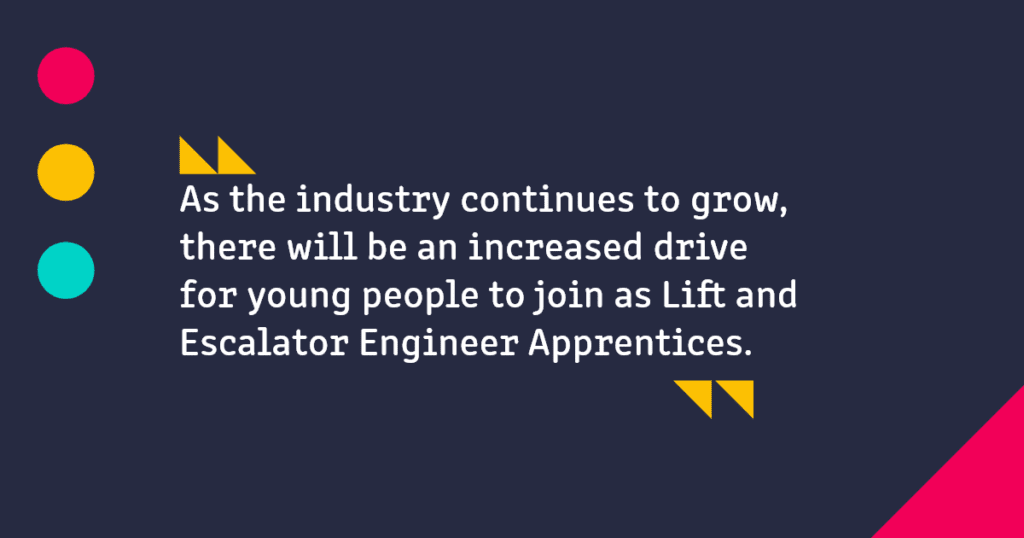Opportunity in the Lift and Escalator Industry
Most people don’t spend too much time thinking about lifts and escalators – which only goes to show how reliable they are. They play a crucial role in keeping people and things moving, with minimum fuss.
The people that keep them moving are Lift and Escalator Engineers who are skilled individuals that construct, service and modernise lifts and escalators of all types.

What do Lift and Escalator Engineers do?
Some of the most typical jobs that Lift and Escalator Engineers carry out are:
- Planned Preventative Maintenance (PPM): carrying out scheduled routine inspections on electrical equipment, gears, drive systems, hydraulics, motors, overload detection devices, brakes, doors and locks; diagnosing defects, carrying out minor repairs; making recommendations and arranging for more serious repairs.
- Emergency call-outs: responding to out-of-hour breakdown calls; isolating problems and carrying out repairs until a full service and repair can be made.
- Installation: after purchase Engineers will commission and fit out lifts, lifting gear, lift wells and ancillary equipment; giving demonstrations on how to operate the equipment.
- Surveys: ensuring through regular inspections that equipment complies with regulations and legislations. Make recommendations for modifications or new installations.
- Refurbishments: upgrades or replacements can be carried out by Engineers on lift interiors, such as panelling, flooring, displays, communication systems, buttons, lighting and finishes.

Engineers are capable of dealing with different lifts, including:
- Passenger, goods, and service lifts that you find in offices, hotels, railway stations and airports.
- Loading platforms and scissor lifts that are used to load/unload and move material, machinery and products around a factory floor or storage depot.
- Mobility stairlifts that are installed in people’s homes or as access points to public buildings.
- Vehicle-mounted lifts that are used in personal and commercial transport.
- Dumbwaiters in hotels and restaurants.
- Escalators in shopping centres, terminals and offices.
The job description varies depending on the location, level of experience and various other factors, but If you’re interested in this career, then there are plenty of opportunities.
The average lift engineer salary in the United Kingdom is £35,000 per year or £17.95 per hour. Entry-level positions start at £30,170 per year while most experienced workers make up to £43,585 per year.
A Growing Industry
The growth rate of the UK lift and escalator market is 4.6%, with an estimated value of $4501.51 million by 2026.
Growth in the UK market is driven by widespread usage of lifts and escalators in residential, commercial, and industrial areas, including shopping malls, railway and tube stations, hotels, airports, public buildings, high-rise apartments, etc.

The market has been primarily swayed by rapid urbanisation, substantial evolution of architecture and increased Government initiatives for the construction sector. The high demand for lifts and escalators is backed by the increase in the demand for better traffic management spaces and updated Government standards for smart infrastructure.
As the industry continues to grow, there will be an increased drive for young people to join as Lift and Escalator Engineer Apprentices.
Prospective Employers
There are an array of companies to work for, as there are over 100 Lift Maintenance companies that operate in the UK alone, with 164 being members of the Lift and Escalator Industry Association (LEIA).
Only companies whose turnover significantly involves work directly undertaken in the manufacture, supply and/or servicing of lifts, escalators, lifting platforms, vertical lifting appliances and stairlifts can be members. They also require the following certifications:
- ISO 9001 – Organisations use this standard to demonstrate the ability to consistently provide products and services that meet customer and regulatory requirements.
- ISO 45001 – Organisations use this standard to demonstrate health and safety at work, developed by national and international standards committees independent of government
The objective of these requirements is to provide reassurance to customers when dealing with member companies.
Apprenticeships

To start an Apprenticeship in the Lift Industry, you must be over 16, live in England and not be in full-time education. The rest varies depending on the employer. For a level 3 Apprenticeship, it’s usually three or four GCSEs at grades 9 to 4 (A* to C), or equivalent, and ideally includes English, Maths, Science and Technology.
To start an Apprenticeship in the Lift Industry, you must be over 16, live in England and not be in full-time education. The rest varies depending on the employer. For a level 3 Apprenticeship, it’s usually three or four GCSEs at grades 9 to 4 (A* to C), or equivalent, and ideally includes English, Maths, Science and Technology.
There are many different types of businesses in the industry. Some big multinationals, and some smaller specialists. They each offer a unique Apprenticeship experience.
This page will help you find the employer that best fits you, so take the time to learn about them, it could help you land your Apprenticeship.
Every employer’s different. But it’s typically three stages; a paper application or CV, a phone or video call interview and then a final interview or assessment day.
Employers will be looking for people with a real interest in engineering and a curious mind. Any hobbies or work experience that show this will help. But don’t forget the basics – be on time, friendly and communicate well.
It can be anywhere between two and four years with three years as the average.

What Does the Future Hold

After completing your Apprenticeship, it’s important to enjoy the moment. It’s a brilliant achievement and you should feel good about earning it. Because they’ve invested so much in you, it’s very likely that your current employer will offer you a permanent job with a higher salary that suits your skills. You’ll also get a formal certificate of your qualification.
With experience, you could move into supervisory management, technical sales or general engineering. You could even potentially go on to a Higher Level 4 Apprenticeship which is the equivalent of a Degree. There’s no limit.
Having a qualification makes you highly skilled and sought after. You may want to work abroad, or you’d like to specialise in a particular area or you want to work for a different-sized company. It’s all there for you to explore.
Joining a professional organisation plugs you into a network of advice, news and opportunities in our industry. It also demonstrates your commitment to constantly improving your skills. You might want to check out LEIA, the Engineering Council and the Society of Operations Engineers.
Do you have what it takes to be a great Lift/Escalator Apprentice? Let’s find out…
Find employers
There’s a brilliantly diverse range of employers in our industry. Lifts and Escalators are essential to keep everything moving, so we’re constantly growing. If you want to level up your career, you’ll find your perfect employer here.
Search Now